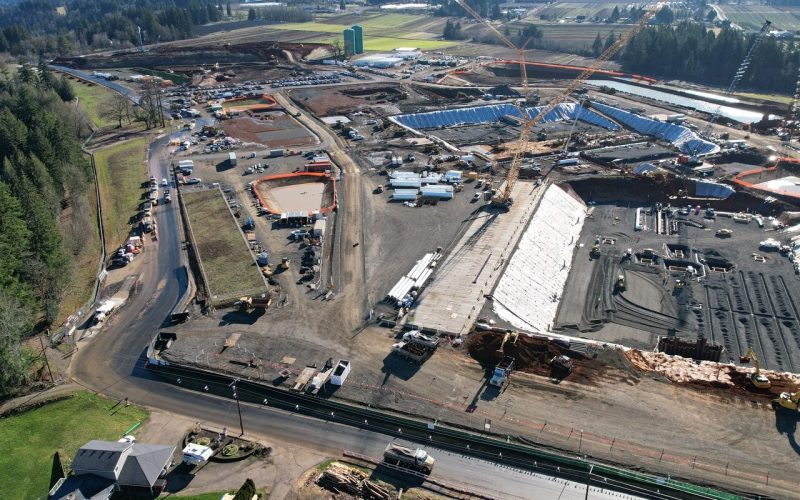Another setback to the expensive and contentious project, which is facing an impending regulatory deadline, was announced Friday when Portland officials announced that the city has temporarily halted building on its $2 billion water filtration plant east of Gresham.
The ruling was made a few weeks after a state agency agreed with the project’s opponents and revoked a section of a conditional land-use permit needed for the Bull Run water treatment facility.
On January 22, the Land Use Board of Appeals declared that Multnomah County officials had not assessed whether the filtration plant’s development on city-owned land south of Oxbow Regional Park would negatively affect the natural resources of the rural area.
The conditional land-use application was returned to Multnomah County for additional examination by the agency, which upheld other permit terms. Parties were given until Wednesday to contest the decision, but none did.
Construction will now be halted while the county review process, which could take up to 120 days, is underway, according to city officials.
In the upcoming days and weeks, we’ll be working with the county and [the Land Use Board of Appeals] to better understand the timeline and project impacts, but there are a lot of unknowns right now, including how long the pause will last,” Water Bureau spokesperson Felicia Heaton told The Oregonian/OregonLive.
According to Portland officials, in order to meet federal drinking water rules and remove impurities such as the parasite cryptosporidium, the city must have the new water treatment facility functioning by 2027.
If this isn’t done, the federal government may impose daily fines or order Portland to start issuing boil water alerts until the new filtration plant is operational, the city said.
The Bull Run water filtration plant is located on a sizable piece of forest land that the city bought in 1975, but it is not zoned for the project, thus it now requires a conditional land-use permit.
When the city started planning the project about ten years ago, it took into consideration at least six different places.
For years, a collection of farmers, businesses, and rural people have opposed the city’s major public works project near the 95-acre building site.
According to Lauren Courter, a prominent opponent of the proposal, this is a significant victory for our community. The city will incur additional costs and risk missing its deadline if construction is disrupted.
But the community’s resistance shouldn’t be held responsible for the city’s expenses, Courter added. Knowing that its proposal would not be able to comply with the land use regulations, the city selected this location. How is it possible to build a massive industrial project worth $2 billion without having a negative influence on natural resources?
The filtration facility has had multiple delays and a skyrocketing cost of $2.1 billion, four times the $500 million plan initially approved by municipal elected leaders in 2017, due to strong opposition and a variety of other causes.
Officials in Portland have just over two years to finish the project before the September 2027 deadline, having finally started construction last year.
Mayor Keith Wilson said in a statement on Friday that building the filtration facility is the appropriate thing to do to safeguard the public’s health. In order to resume construction of this important project as quickly and affordably as feasible, we will continue to actively participate in the land use process and look forward to resolving the issues on remand.
With a proposal before the Legislature that would let the city’s water filtration facility to avoid Oregon’s usual land-use appeals procedure, Portland authorities are attempting to stifle ongoing opposition.
If the U.S. Environmental Protection Agency, Oregon Health Authority, or Oregon Department of Environmental Quality has set a deadline for the building of a public health infrastructure facility, the measure would permit it to be constructed on any kind of land.
Portland simply modifies its water by adding chlorine and ammonia as disinfectants, as well as sodium carbonate and carbon dioxide to lessen its corrosiveness. Portland takes pride in its pure Bull Run water, which comes from a large virgin watershed of the same name close to Mount Hood.
Since cryptosporidium was appearing in city water samples much too frequently, the EPA and the Oregon Health Authority declared in 2017 that this needed to change. Dehydration, vomiting, and diarrhea can result from drinking water contaminated with some parasite strains.
Federal regulations on cryptosporidium have been criticized for being outdated and misleading, pointing out that human health is not at risk from animal-borne strains of the parasite that are occasionally found in the Bull Run watershed.
— Shane Dixon Kavanaugh focuses on accountability and watchdog reporting while covering politics and city administration in Portland.
His number is 503-294-7632.
Get in touch with [email protected].
On BlueSky@shanedkavanaugh, follow X@shanedkavanaugh.
Your support is essential to our journalism. Sign up for OregonLive.com now.
Stories by
Shane Dixon Kavanaugh
-
Portland pushes for state land-use exemption to thwart Bull Run water treatment plant challenge
-
Portland averts city worker strikes after making big concessions to public unions
-
Portland City Council grills top bureaucrat, grants him 11-month job extension
-
Portland to delay placing pricey new parks levy on ballot
-
Top Portland safety official spent last 4 months working from Las Vegas, says he ll step down this spring










